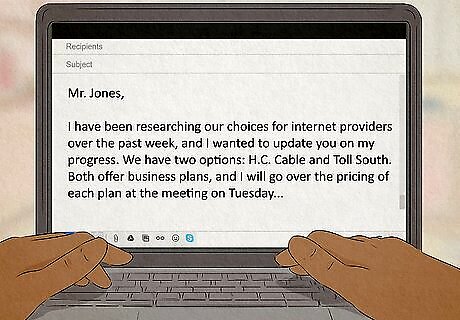
views
Managing Their Moods

See the storm coming. Start noticing patterns in your boss’s moody behavior. For instance, your boss might typically be in a foul mood in the mornings before having some coffee or after having a meeting with their own supervisor. If you know that your boss will be in a mood during those times, keep your head down, do your work, and avoid asking them questions until later. Select meeting times when your boss’s mood seems to be better or during low stress periods at work. You might also consider making a note of every time your boss is in a bad mood. Write down the time and the circumstances surrounding their mood.

Give them space. When your boss is in a foul mood, avoid knocking on their door or calling them to ask them questions. Instead, work to problem solve on your own and avoid making any major decisions until you can clear it when your boss is in a better mood.

Defuse situations with gratitude and kindness. When you feel that your boss is on edge and on the verge of an outburst, do what you can to deescalate the situation. If they have recently helped you with something or given good advice, send them an email saying “Thank you for all of your help with my project yesterday.” This will help to stroke their ego a bit, soothe them, and avoid them seeing you from a lens of anger. You might also do a random act of kindness for them like bringing them some coffee.

Make sure it’s not you. Though you might feel that your boss is moody, you should first determine what you are doing, if anything, to contribute to that. If you do not complete your tasks on time, regularly come in late, or often make mistakes, then you could be the problem. Work to improve yourself so that you do not trigger frustration in your boss or peers. Listen carefully when your boss gives you a task or a piece of constructive criticism and work to follow through. Don’t use your cell phone during this time. However, regardless of what you have done, your boss should not yell, curse, or insult you. If your boss’ behavior appears is abusive, you need to seek help from a trusted human resources professional. If you feel like your boss is criticizing you for something that is not your fault, discuss your concerns with them. Create an atmosphere of problem resolution rather than confrontation.
Maintaining Professionalism

Have a conversation. If you are considering reporting your boss for their behavior, pause before going to upper level management. First, have a talk with your boss to see if things improve. There could be things going on in their life that you don’t know about or perhaps they are frustrated with your work as of late. During a time of calmness, approach them and see if they have a few minutes to talk. If they are typically very busy, then set up a meeting beforehand. Say something like “I really enjoy working here but sometimes, especially in the mornings, you yell at me and other team members. That makes it hard for me to want to work hard for you because I am frustrated. Is there anything going on with you right now or anything that I can do better or differently? Try to manage your own emotional reaction to keep from inflaming the problem.

Document everything. Moodiness might cause your boss to accuse you of poor performance, even when you are doing your best at your job. By keeping detailed records of what the boss has asked of you, including asking for clarifications, extensions, and changes to your work, you can provide proof when your moody boss accuses you of not following directions. It's not your place to prevent their moodiness, but it is your place to prove that you had a set of expectations in place and that you have fulfilled these as requested. After meetings with your boss, consider sending them an email about what you were asked to do, to clarify. You can say something like “As a clarification, in our meeting you said that you want me to create a one page document highlighting all of our services and to share it with the team before publishing it. I wanted to confirm that this is correct before moving forward.”

Interact politely but assertively. Know that you have a right to express your boundaries in the workplace. This means making it clear in a polite but forthright manner when things are not appropriate in your interactions together. For example, if your moody boss is working up to a screeching match about some work you've done, instead of screeching back, simply say firmly that you will return to discuss the work when the two of you have had a chance to calm down and think about it a little more. Or, if you feel constrained to sit there, be calm and confident and when the tirade ends, simply say "Thank you for your observations. I will consider them all in detail and provide you with a written response." Use evidence and logic when your moody boss veers off into blanket allegations or rants. Avoid accusations, allegations, and ultimatums yourself. These upset any person, moody or not, and even if your boss is using these tactics, don't copy.
Taking Care of Yourself

Stay calm. When your boss is in a bad mood, work to stay as calm and tranquil as possible. If you cannot leave the situation, take a few deep breaths in through the nose and out through the mouth. If you can make an escape, take a walk around the block, go get a snack, or even take your lunch break. Doing so will prevent you from lashing out.

Limit your interactions with them. Though you cannot avoid them entirely, you can certainly limit your interactions. Instead of popping in their office to ask a question, send an email instead. If you tend to end up in the elevator with them in the mornings, take the stairs instead or arrive a few minutes earlier.

Stay healthy and well rested. It is much harder to deal with other people when you're sleep deprived or hungry. Daily exercise, regular and healthy sleep patterns, and nutritionally sound eating are crucial in dealing with difficult people because you'll feel strong in body and mind, and you won't easily succumb to the stress.

Have a sense of humor. Humor can greatly boost your own mood as well as general office morale. Take some time during your difficult work day to laugh. You can watch funny videos online, find some hilarious memes on social media, or call up a friend of yours who is sure to make you laugh. With your coworkers, avoid making jokes about your boss, however.

Know when to get help and when to leave. If your boss’s mood is affecting your health and you have already spoken to them, then it is time to make a report or find a new job. If others in your department have reported them as well, it may be worth it to wait it out before finding alternative employment in case your boss is fired. If your boss ever hits you, is sexually inappropriate, or verbally abusive, report them immediately. Do not wait it out. An example of verbal abuse would be if your boss calls you stupid or uses racial slurs.




















Comments
0 comment